
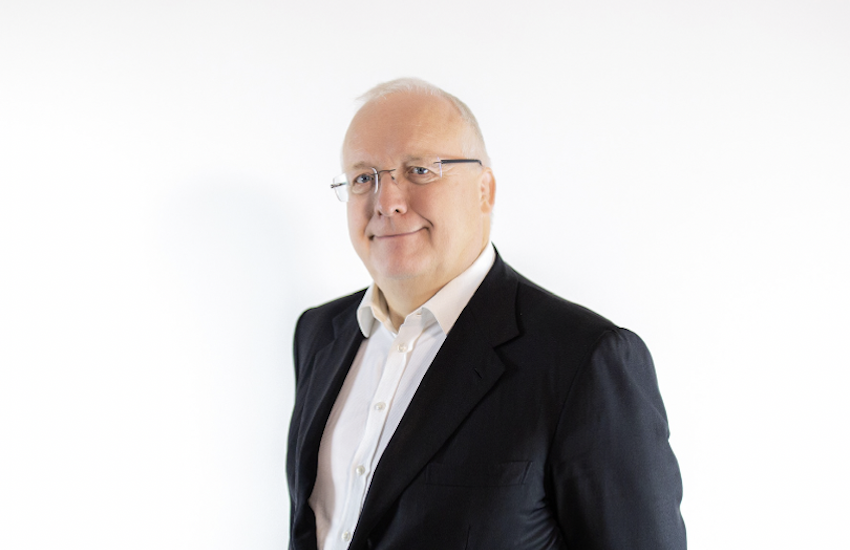

With Guernsey facing a housing crisis, there are lots of opinions on how the island can tackle the problem. One common suggestion is through modular housing.
As Director of Omnibus Investment Holdings, Property developer Charles McHugh shares his views with us, 'unplugged'…
Globally, our times are marked by a critical shortage of affordable housing. These shortages mean that many families and individuals are unable to progress and plan the lives they want for themselves, and the effects of housing instability are felt across the economy. Guernsey is no exception from trends. The recent energy crisis has served again to highlight that much of the existing housing cannot meet the environmental and insulation standards that is required in a time of global warming and rising energy costs. While ‘Modern Methods of Construction’ (MMC) have been used internationally for many years – and therefore are no longer considered pioneering – these methods are important as they advance on traditional construction methods in meeting the significant challenges of our times.
MMC refer to innovative construction techniques and technologies that aim to improve efficiency, sustainability, and quality in the construction industry. These methods encompass various approaches. Techniques such as modular construction, prefabrication, and 3D printing allow for the efficient assembly of homes at lower costs, making housing more affordable and accessible.
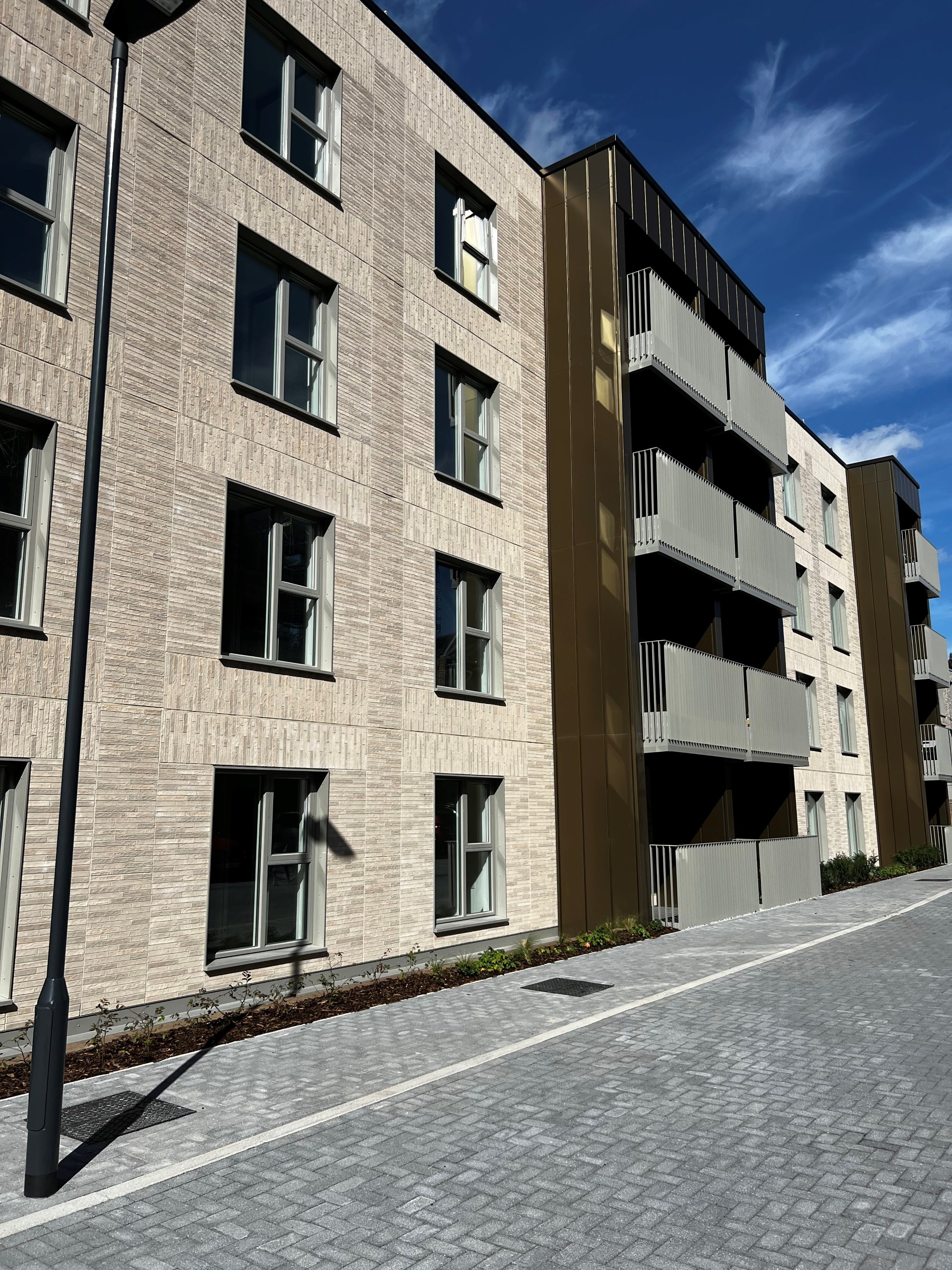
Pictured: An example of ‘Modern Methods of Construction’ (MMC) from elsewhere.
First and foremost, MMC can significantly speed up the construction process, enabling faster delivery of much needed housing units. Not only can MMC contribute to the goal of producing more energy efficient housing, MMC responds to the challenge that the construction process itself has traditionally been responsible for high levels of waste, carbon emissions, and resource depletion. MMC promotes sustainability through efficient use of materials, reduced waste, and better energy performance of buildings. Techniques such as using renewable or recycled materials, and integrating energy-efficient systems, contribute to lower environmental impacts.
Guernsey faces the additional hurdle that the cost and rate of building on island is largely restricted by the challenges of importing materials and labour. High Pre-Manufactured MMC systems such as volumetric, which use off island labour, present an attractive opportunity to increase the build rate with less logistical challenge than conventional building. Post-Brexit the UK and local construction industries have faced huge logistical and resource challenges, for example, many European workers no longer find it attractive to work in the UK. This has resulted in rapid labour, materials and resource inflation in the industry. These modern challenges require modern solutions.
The benefits of MMC – like the methods of MMC - are many and are varied. MMC is recognised as a means of improving project efficiency, achieving better quality through the integration of digital designs and robotic Computer Numerical Control machining and assembly processes. Improved sustainability through minimisation of material waste through factory processes and better performing building design. MMC is gaining traction in European markets, its adoption is expected to expand even further in the future.
Factors that we see playing out locally as well as internationally such as a growing population, urbanisation trends, and the need for affordable housing solutions are likely to drive increased demand for modular construction methods, and advancements on traditional methods.
The cost of construction is a crucial driver of the lack of affordable housing for young islanders who are struggling to take their first steps onto the housing ladder. Cost is an important factor for Guernsey where local building costs are over 30% higher than the south of England.
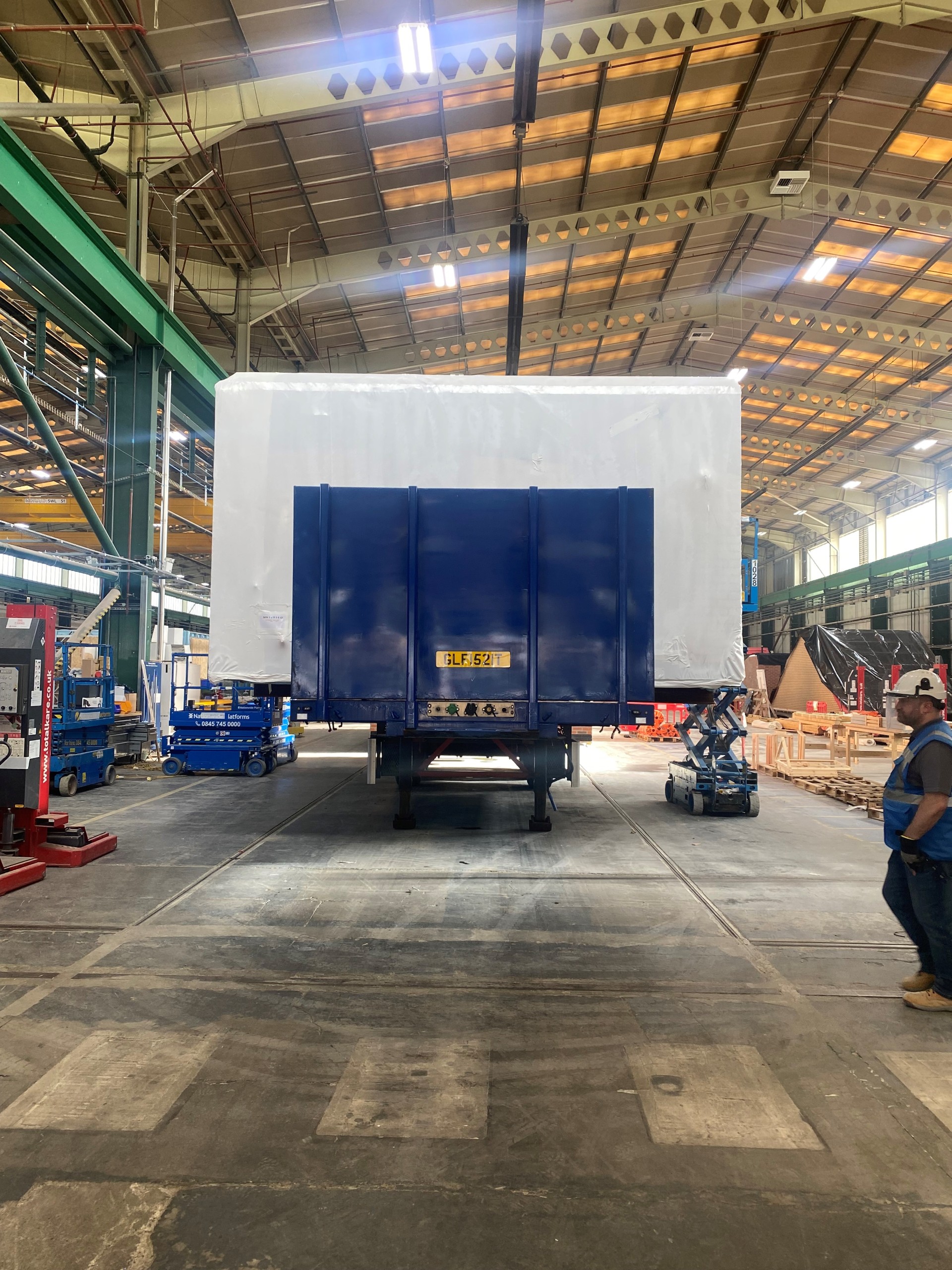
Pictured: Transport costs to the island incur a premium, warns Mr McHugh.
The cost of delivery of materials and labour to the island incurs a premium. In Guernsey we face a skilled labour shortage and significant freight costs on importing building materials. By using off-island produced volumetric housing we can, to some extent, protect ourselves from the premiums of delivery. With materials and labour sourced at lower cost on the UK mainland, along with reduced materials waste on site, contributing to offsetting the logistics cost of transporting the modules to Guernsey. These reductions in price are transferred directly to the islanders who can benefit from the production of more affordable housing.
Reducing costs is only one beneficial driver that has led to the growth of MMC over traditional construction. Holistically factors that ought to be compared are limited space, reduced disruption, quality control, speed of construction and sustainability. In particular, volumetric modular construction could offer significant benefits for construction projects in Guernsey, helping to address our housing shortages, infrastructure needs, and environmental sustainability goals.
Construction can be slow at the best of times. Islanders are patient people: we know too well how bad weather can lead to delays in deliveries and stalled travel plans. Traditional construction projects are often delayed by poor weather, difficulties in procuring materials and local skilled labour shortages. The affordable housing crisis in Guernsey cannot wait any longer; many individuals and families have been patient enough already.
The scale of the residential building challenge is huge. The States Strategic Housing Indicator recently set out that 1,565 new homes should be built between 2023 and 2027.
Volumetric modular construction offers faster construction timelines because site preparation and factory module fabrication can occur simultaneously. This can help expedite the delivery of much-needed housing and infrastructure projects on the island. On large sites. demolition, groundworks, drainage, power, water supply, road building and foundation works can all occur on site while modular fabrication is underway in the factory.
If we were to rely on traditional building techniques to meet the housing challenge, this would require an imported, non-local, skilled workforce of c. 350-500 workers over three and a half years. The island would be visibly ‘under construction’ as these workers erect 1,565 homes on large sites. The logistical challenges of importing and accommodating these non-local skilled workers has no easy solution and inevitably would exacerbate the overheating of the local housing market as well.
Modular housing avoids the need to import hundreds of skilled workers and the cost of residency requirements that need to be undertaken. Of course, this poses a different set of challenges, albeit challenges that can be readily met in tighter timelines. These solvable challenges relate to the logistics of moving modules to the island. Modular development in Guernsey will rely upon UK factory production capacity, and requires chartering vessels, cranage, marshalling on our docks, and storing modules on site to achieve the required build out rate.
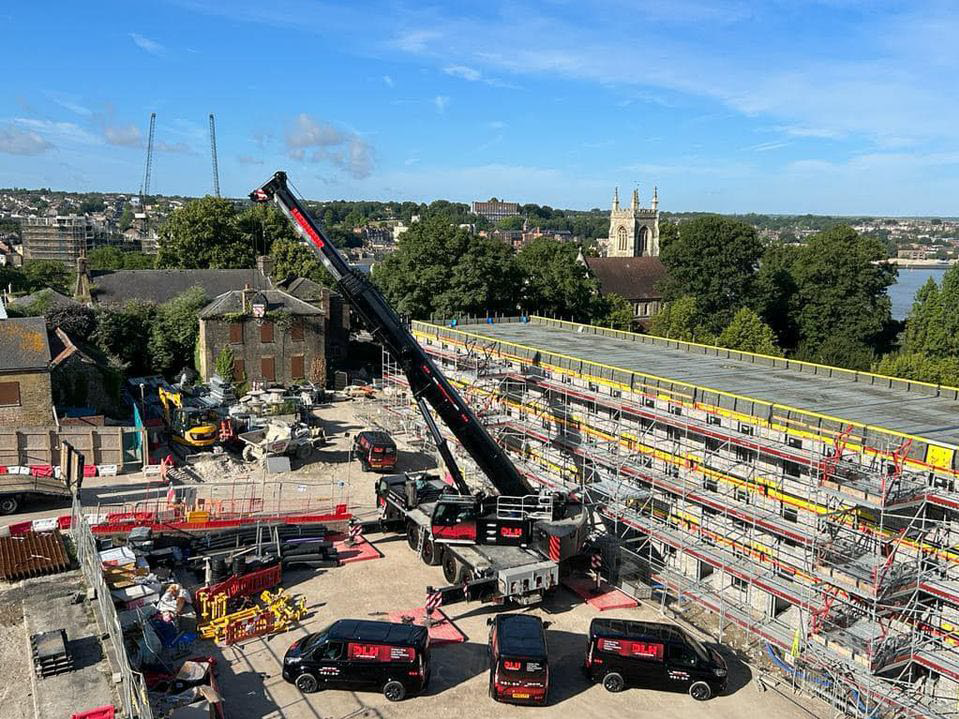
Pictured: An example of ‘Modern Methods of Construction’ (MMC).
The efficiency of modular building will be clear once these logistical hurdles are cleared and installation is underway. Once on site up to 15 modules a day can be installed on the foundations that have been preprepared and connected to the infrastructure that has been pre-installed in the ground.
We are all vulnerable to the impacts of climate change, making sustainable construction practices a priority. Volumetric modular construction can incorporate sustainable design principles, such as energy-efficient materials and renewable energy systems, to minimise environmental impact and reduce reliance on fossil fuels.
Modular apartments are built upon traditional concrete foundations that are piled and use eco-friendly and dynamic Light Gauge Steel Framing (LGSF) or timber frame off-site structural solutions in a factory setting. The completed volumetric modules are craned into position.
MMC minimalises the impact on the development site compared to traditional methods, (e.g. dust, noise, traffic and waste). Operating at scale, off-site modular construction will produce better quality homes in half the time and with less disruption of traditional construction.
A key measure of construction quality over time is the energy performance of the building. Increased energy performance as a result of high build quality will impact operational costs (in particular energy related costs) and the whole life carbon performance of a building. Carbon emissions in housing are associated with operational or occupancy related emissions (i.e., energy, maintenance, and repair).
MMC manufacturers claim to offer superior wellbeing for home users for a variety of reasons: healthy, safe and comfortable homes, better environmentally than traditional builds, low carbon, efficient LED lighting, air source heat pump, PV panels, and smart metering and controls can optimise comfort and energy use.
As with all progress and innovation, it is important that safety and regulation plays a role in managing change. MMC design has advanced over the last decade to address many of the sector concerns surrounding prefabricated building design.
The Building Standards for modular buildings are a developing picture with new legislation anticipated. For instance, Building Regulations and a new British Standard Institute paper are due to be published in the next two years. That said, important steps have already been taken and implemented. Build Offsite Property Assurance Scheme (BOPAS) was developed to address concerns and perceived risks associated with innovative construction. BOPAS accreditation provides an appropriate life expectancy and there are various ISO accreditations. Most UK modular manufacturers have already incorporated design features that exceed current Building Regulations and these developing standards.
BOPAS has been designed to provide assurance on MMC products specifically for mortgage lenders insurers and warranty providers. It also provides general assurance that the MMC system is considered holistically and therefore should provide additional assurance to wider stakeholders in the housing industry. All major UK lenders support MMC products and the Lloyds Register support them for insurance purposes.
At all stages of any design it will need to meet the site-specific requirements of Guernsey’s hostile marine environment. These concerns apply equally to both MMC and traditional construction methods.
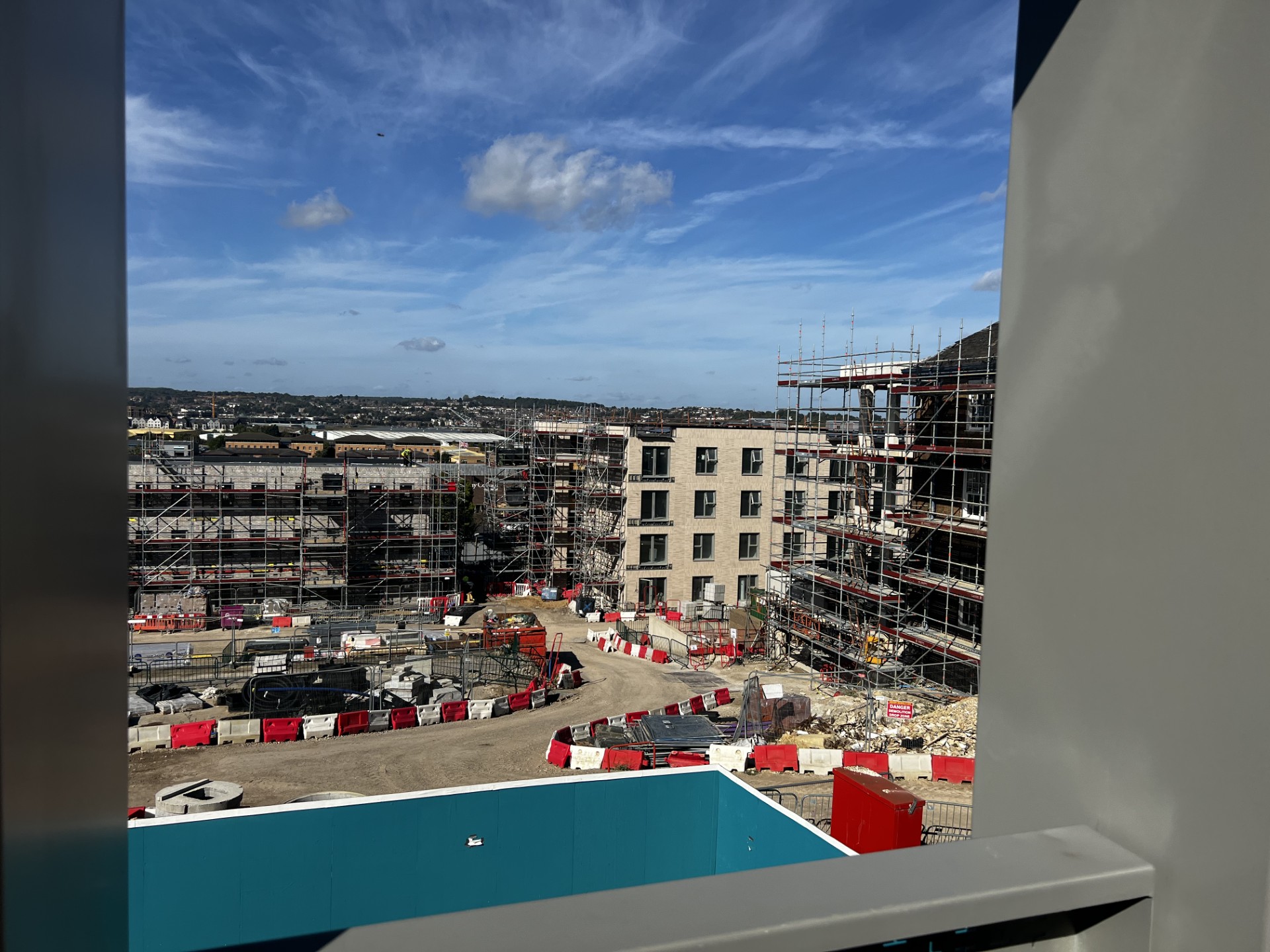
Pictured: An example of ‘Modern Methods of Construction’ (MMC).
Modular building needs to be appropriate for Guernsey and its unique character. We have addressed the logistical challenges of transporting modules to Guernsey which involve detailed appraisals and forward planning.
Good quality, sustainable, and affordable housing is what islanders need and deserve. This is the central goal and the minimum standard that modular housing should meet. It is understandable that new methods and innovation should inspire a critical eye, and be held to account to meet our island’s justified high standards. If there is a perception that modular housing is of lower quality, I hope the responses above have already begun to undermine this.
The benefits of MMC do vary according to the exact methods used and the application it is used for, but MMC has been favoured in many high quality building projects. MMC is recognised as a means of improving project efficiency, achieving better quality through the integration of digital designs and robot machining and assembly processes. Improved sustainability through minimisation of material waste through factory processes and better performing building designs.
Construction standards are high where MMC is used, and there are advantages over traditional building methods in this regard. On a traditional building site a building will emerge over a long period of time and be exposed to adverse weather conditions until it is designated wind and watertight. Homes built in a factory remain dry throughout construction which is a significant improvement for quality and speed.
Fire safety design is an important issue which the modular manufacturers place the utmost emphasis on and they have addressed the compliance fire certification challenges for their products. This has involved the manufacturers in constructing completed residential blocks and then burning them down under test conditions to achieve the necessary fire safety performance testing certification. Detailed designs address and are fully compliant with all Building Control and fire safety regulations that are current.
The industry regulator BOPAS considers and supports best practice in the design, manufacturing and installation processes of MMC providers that perform design, manufacture, construction and/or project management activities within the MMC sector. The evaluation process comprises an assessment of the integrity of both the construction system and the processes by which that system is designed, manufactured, and constructed, or project managed against the high requirements of the BOPAS standard.
MMC is an answer to Guernsey’s critical housing crisis. Guernsey has a problem if it is to meet the requirements of the States Strategic Housing Indicator target of 1,565 new homes between 2023 and 2027. Housing supply is incredibly important to many key sectors of our economy. The targets as currently set are beyond the capacity of the local construction industry and we are looking at the same type of housing plans we were looking at ten to fifteen years ago. These plans haven’t worked and Guernsey has consistently failed to achieve the housing supply levels it needs to protect its economy.
MMC has a series of challenges attached to it, but these challenges can be overcome with the right public, private support we can achieve the supply targets we need. MMC can halt the exodus of Guernsey’s brightest and best young people who too often leave the Island to study at university and are unable to return because they cannot afford housing.
MMC is not a magic bullet, but it has an answer to many of the intractable issues that surround the skilled labour and resource shortage in the island as well as reducing the cost of residential building locally. For me it is a no brainer in terms of what the island housing needs are right now.
In the last two years the advances in MMC production have been staggering. There have been several mergers and corporate casualties in the UK modular housing sector. This is to be expected in a new field such as MMC with big players like Legal and General, Goldman Sachs, Aviva and Persimmon Homes as well as the UK Government involvement through Homes England. The industry trend is investment in more automation and robotic production. There are many significant investments with rapid growth strategies being made in the MMC sector.
Two years ago, I visited a state-of-the-art factory producing some 2,000 homes a year with a labour force of 2,500 that was 25% robotic. Recently, I have seen a factory that employs 1,000 people, is 75% robotic and expects to produce 5,000 homes a year. The trend is towards bigger investment, higher volumes, more automation and standardisation of design, and the benefits will be reaped by an increasing number of homeowners; some of which I hope will be our islanders.
Not in my lifetime.
That said, having lived through digital, green, and financial revolutions during my lifetime I have learnt that change is inevitable and that there is huge benefit in embracing innovation.
This article first appeared in CONNECT, Express' sister publication.
The latest edition of CONNECT can be read HERE.
Comments
Comments on this story express the views of the commentator only, not Bailiwick Publishing. We are unable to guarantee the accuracy of any of those comments.